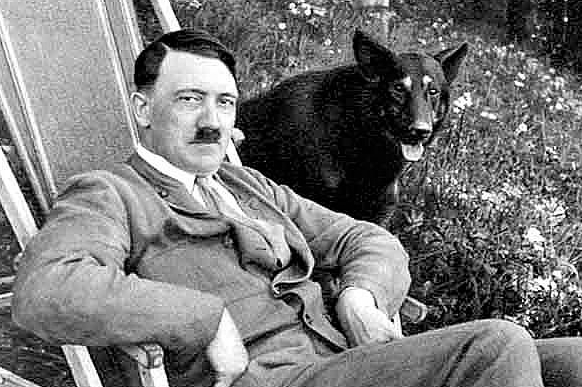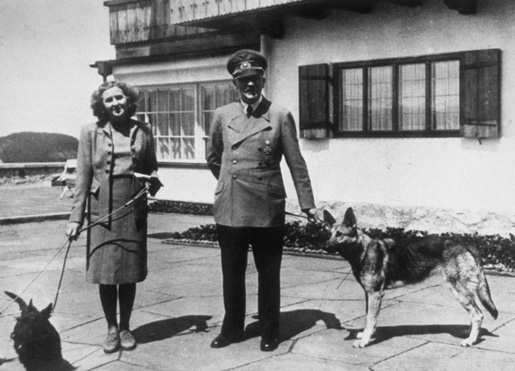
Like many of you, I used to think that Hitler loved and was nice to his dog. I had heard, of course, that his personal secretary had testified to this. She, after all, was there, from 1942 until his death by suicide in 1945. But then, I did a little research. I have concluded that we do not and probably will never know how Hitler treated his dog, this one lady’s latter-day stories notwithstanding.
First of all, if Hitler was so nice to his dog, why would only Ms. Gertraud “Traudl” Junge mention it? Why isn’t it, for instance, in Goebbels’ diary? Why, moreover, didn’t Goebbels’ secretary mention this alleged “love”?
Second, consider what we know about Nazis. Firsthand testimony portrays Hitler’s propaganda minister Joseph Goebbels as “a cold and distant monster.”
‘You couldn’t get close to him,’ said [Goebbels’s secretary] Frau Pomsel. ‘He never once asked me a personal question. Right up until the end I don’t think he knew my name.
Does this sound like someone who’d love and be kind to animals, who are lowlier creatures than secretaries? Hardly. We know that in general, Nazis were heartless and cruel, even killing people – so they would think nothing of mistreating mere dogs. Again, it is well known that they viciously treated the mentally handicapped; we should expect then that dogs would get even worse treatment. This casts significant doubt on Hitler’s secretary’s reports of his niceness in general, both to her and to the dog. What his regime did to the Jews needs no recounting. Did the architects of the mass-murder machine go home and snuggle their precious little puppies after a hard day’s work? Did they love kitty-cats too?
Going beyond our general knowledge of Nazi meanness, there is what we know specifically about Hitler. He clawed his way to power, having associates ruthlessly murdered. And we have an early speech of Hitler in which he says, about the German people, “We, too, are human beings and notdogs…” Note the contrast – creatures of dignity, with low-down, mangy, unclean animals, devoid of honor. We could mention countless other dirty deeds, done dirt cheap. Hitler’s actions show him to be a heartless, cruel, monster. Sure, as an ideologist, if you’re a Nazi or some other sort of extreme right-winger, you can conclude by ideological loyalty that Hitler was kind to animals. But as a historian, you must stand back and demand extraordinary evidence for this most unlikely claim. Historians deal in evidence, not in loyalty.
 Now, you may have seen images of Hitler and his lady posing with or walking their dogs. If so, you too have been fooled by the propaganda machine. Of course the Nazi image-makers wanted to portray Hitler as a dog-lover; most people are dog-lovers, and this would endear him to the masses whom he sought to control. Consider the source. Trusting this picture makes as much sense as going to your local penitentiary and believing the convicts when they tell you they were wrongly convicted. Critical thinking, and not credulity, is what is called for.
Now, you may have seen images of Hitler and his lady posing with or walking their dogs. If so, you too have been fooled by the propaganda machine. Of course the Nazi image-makers wanted to portray Hitler as a dog-lover; most people are dog-lovers, and this would endear him to the masses whom he sought to control. Consider the source. Trusting this picture makes as much sense as going to your local penitentiary and believing the convicts when they tell you they were wrongly convicted. Critical thinking, and not credulity, is what is called for.
Third, the old secretary Frau Junge can’t seem to get her story straight. She says that Hitler loved and was kind to his dog, but she also says that he tested out a cyanide capsule by feeding it to his dog. (It worked!) Which is it, then – did Hitler love his dog, or hate him? She destroys her own credibility here.
Fourth, it is pretty clear what is going on here. Suddenly, in a 2002 interview, some 57 years after the fact, this lady, incredibly, tries to portray Hitler as nice to his dog, and not only that, but to nice to his secretaries and other support staff. This is highly suspicious. Where was she for all those years, letting Hitler be portrayed as a monster? She admits her own long term burden of guilt, for having personally served Hitler. How to lessen her guilt? Put out this new image of Hitler as a sensitive, kind human being, nay, a lover of animals like you or me. How can one blame her for liking, working for, and being loyal to such a man – not a monster through and through, but a complex man, with good and bad qualities. This just doesn’t fit what we know of Hitler and Nazis in general. At the time of this interview, she’s near her own death, and wants to clear her name – that’s what’s going on here.
Note too her many “convincing details.” It is well known that this is what liars do to boost their credibility. Had she been reporting genuine memories, they would have been hazy and faded. But this woman, we’re to believe, miraculously remembers specific days, conversations, detailed events. Again, she says some mildly insulting things about Hitler’s lady Eva Braun. Jealous? Did she not only serve Hitler, but have a crush on him? This is just a hunch, but I would say: absolutely. In sum, she was, to put it gently, a highly motivated “witness;” we must take her reports with a pound of salt.
A simple-minded person may urge that she is believable, and that moreover all the photos and films of Hitler seeming to enjoy his dog amount to at least two independent witnesses to the fact. This is what I used to think. But as I’ve shown, it is at least as probable that he hated dogs and was mean to them, though propagandists actively painted the opposite picture. This was later, conveniently, embraced by a sad, guilt-ridden old woman who had every reason to lighten up the public’s image of Hitler.
Did Hitler love his dog? We’ll probably never know. In my personal opinion: probably not.
![Tullius est [et Tullius non est Cicero]](https://blogger.googleusercontent.com/img/b/R29vZ2xl/AVvXsEhwDG4xhsMn9o9J6nFVbJuaWEgUYVbxr7B9gbOXGZ3gwOu55lJg3q0Ev-z3MhLy29603_fkvvngkYmsTvRd4BATcVzZvVOhgkPSy-GIAuaFE0sCVBc_zcTW_d2mKKeCWhMxsZhAPyqXzymO/s1600/cicero-right-1024x603.jpg)
No comments:
Post a Comment